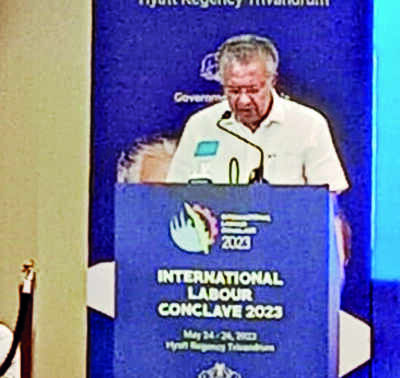- News
- City News
- thiruvananthapuram News
- Kerala has the best records in upholding rights of workers: CM
Trending Topics
Kerala has the best records in upholding rights of workers: CM

Thiruvananthapuram: Chief minister Pinarayi Vijayan has said Kerala has one of the best records in upholding rights of workers the global south. “Kerala has evolved as a role model. We comply with the main principles of the ILO, including the tripartite structure, in which the government, employers, and employees meet to resolve disputes,” he said while inaugurating a three-day international labour conclave here on Wednesday.
Kerala is being exceptional in protecting and advancing workers’ rights at a time when workers’ rights are waning worldwide. In terms of providing decent employment, forming unions, workers’ cooperatives, welfare boards and pension schemes, and ensuring inclusivity and the protection of migrant rights, Kerala has evolved as a role model, he said.
“In Kerala, the right to work is upheld. Child labour has been outlawed. We affirm protection against discrimination. Social security is ensured particularly for women workers. Wage protection is offered. Workers' grievances are resolved. They have the right to organise and form trade unions. Collective bargaining and management participation are also available to our workers. All these are guaranteed by the State’s safety net.”
A significant turning point in the welfare of the workers was the Kerala Welfare Fund Act which ensured financial contributions by the government, employers, and employees. As a result, a large number of welfare boards were set up to serve workers - including women - in the informal sectors.
The recognition of the rights of domestic migrant workers is an integral aspect of the labour policy in Kerala, with a slew of measures in place to support them. We honour them as guest workers. Kerala is one of the most migrant-friendly states in the country. They were especially aided during the Covid-19 pandemic with free accommodation, food, and medical care, he added.
Bill to Protect Domestic Workers
The chief minister said that a specific bill for the protection of domestic workers’ rights is nearing completion. This will be the first time that a state is coming up with such a protection bill for domestic workers in the country. This is apart from the large number of benefits provided to the scheme and care workers in the state, who are predominantly women.
Kerala is being exceptional in protecting and advancing workers’ rights at a time when workers’ rights are waning worldwide. In terms of providing decent employment, forming unions, workers’ cooperatives, welfare boards and pension schemes, and ensuring inclusivity and the protection of migrant rights, Kerala has evolved as a role model, he said.
“In Kerala, the right to work is upheld. Child labour has been outlawed. We affirm protection against discrimination. Social security is ensured particularly for women workers. Wage protection is offered. Workers' grievances are resolved. They have the right to organise and form trade unions. Collective bargaining and management participation are also available to our workers. All these are guaranteed by the State’s safety net.”
A significant turning point in the welfare of the workers was the Kerala Welfare Fund Act which ensured financial contributions by the government, employers, and employees. As a result, a large number of welfare boards were set up to serve workers - including women - in the informal sectors.
The recognition of the rights of domestic migrant workers is an integral aspect of the labour policy in Kerala, with a slew of measures in place to support them. We honour them as guest workers. Kerala is one of the most migrant-friendly states in the country. They were especially aided during the Covid-19 pandemic with free accommodation, food, and medical care, he added.
Bill to Protect Domestic Workers
The chief minister said that a specific bill for the protection of domestic workers’ rights is nearing completion. This will be the first time that a state is coming up with such a protection bill for domestic workers in the country. This is apart from the large number of benefits provided to the scheme and care workers in the state, who are predominantly women.
Start a Conversation
FOLLOW US ON SOCIAL MEDIA
FacebookTwitterInstagramKOO APPYOUTUBE







